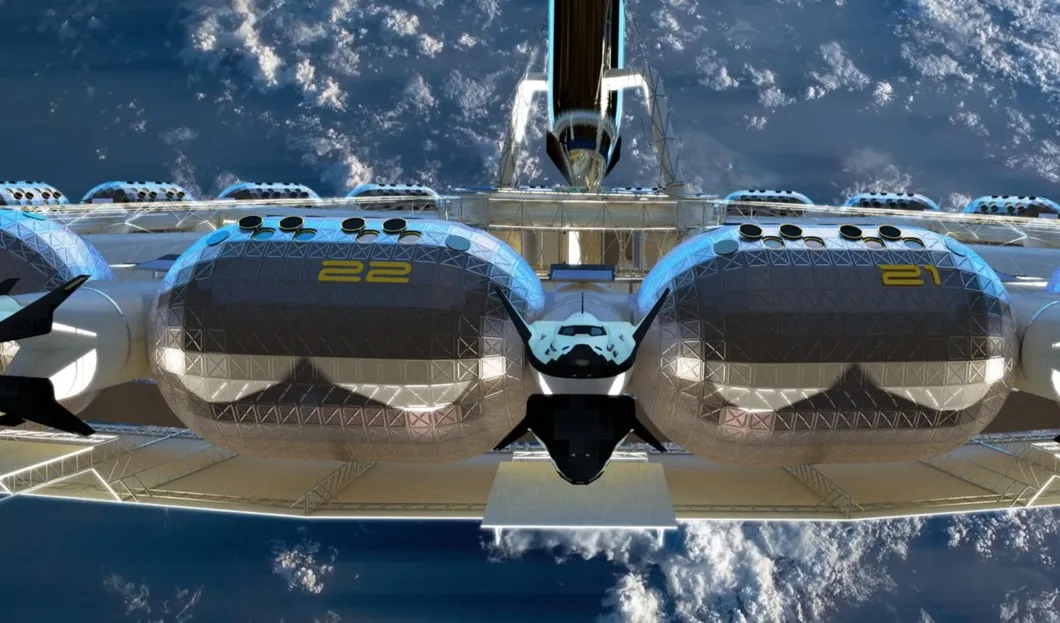
After being portrayed so many times in science fiction films, the first space hotel project has finally been introduced this week, prompting the reaction of those who have always dreamt of traveling outside planet Earth.
The Gateway Foundation released a video on the ambitious space hotel construction, which is set for 2025, just one year after NASA’s expected return to the Moon.
The wheel-shaped hotel with a diameter of 190 meters resembles the space station envisioned by Stanley Kubrick in 2001: A Space Odyssey.
The space station and hotel project called Von Braun Station will be orbiting the Earth in the coming years, said Tim Alatorre, the architect of the Gateway Foundation, the company behind the design of the station.
“The goal of the Gateway Foundation is to have the Von Braun operational by 2025 with 100 tourists visiting the station per week,” said the architect, who announced that the space station will have a maximum capacity of 400 people.
According to the designer, the station, which will be shaped like a huge wheel made up of 24 multi-purpose and lodging modules, will rotate constantly, creating artificial gravity comparable to that of the Moon and making the stay in it much more comfortable than at the ISS (International Space Station), where it is impossible to grasp a sense of direction and orientation.
Alatorre said that, besides the rooms, the space hotel will feature “many of the things you see on cruise ships”, such as restaurants, bars, musical concerts, movie screenings, and educational seminars. He also explained that indoor areas will look nothing like the sterile rooms of the space stations in sci-fi movies. It will be built with the same technology that is used in the ISS.
“As humans, we innately connect to natural materials and colors. The use of fabrics, lighting, and paintings of warm colors and textured materials help us connect and feel at home,” explained the architect, although he admitted that heavy materials, such as stone and wood, will be replaced by “lightweight, easily cleaned natural material substitutes.”
He also explained that the project, which imagines the creation of even larger space hotels, tries to put an end to the current high prices of space tourism, making it accessible to more people and facilitating space exploration.
“Gateway Foundation aims to make space travel accessible to all. There will be true cities in space that will serve as ports of call for those coming and going from the Moon and Mars,” said Alatorre.
By 2030, the plans include that the Von Braun project will expand until it has at least two stations in orbit. By then, the station could house up to 200 tourists a week and have at least 500 people living permanently in it, meaning that around 10,000 people could visit the space every year.
The design of the Von Braun Space Station is based on the model proposed by Werner von Braun himself and named after him. The German aerospace engineer and space architect published his concepts in the American magazine Collier’s during the 50s. He also did it in a series with a very fitting title: «Man Will Conquer Space Very Soon!».
However, the idea was not originally from von Braun. The first concept to create a space station of this style dates back to 1903, when Russian scientist Konstantin Tsiolkovsky came up with an idea that was then taken to film by Kubrick.
It was during World War II that von Braun worked under the rocket development program of Nazi Germany, helping design and develop Germany's V-2 rocket. When the war ended, von Braun and thousands of other German scientists, technicians, and engineers were secretly relocated to the US to work in various military and government agencies.
Von Braun was assigned to work at NASA, where he became the director of the Marshall Space Flight Center. He also served as the chief architect for the Saturn V rocket, which was widely used in NASA's Apollo program.
Alatorre said the Gateway Foundation space station will have the same technology currently employed by the ISS. However, unlike the ISS, the space hotel will have artificial gravity to ensure that guests have a comfortable stay.
Its construction will be carried out on Earth and will later be assembled in space using drones and robotic equipment. The inner ring (described as docking hub) will serve as a docking port for ships to deliver passengers and cargo, while the outer ring, with a diameter of 190 meters, will function as the “spine” and provide infrastructure for the entire station.
The design of the facilities will resemble an urban hotel with the exception, of course, of the views, which will be infinitely better, with the possibility of witnessing the curvature of the Earth from the bed. Eventually, the station will offer space “field trips”, making it possible to visit other space stations or even the Moon.
For Alatorre, once the station is open to the public, traveling to space for holidays will become a common activity for most people.
“Eventually, going to space will just be another option people will pick for their vacation, just like going on a cruise or going to Disney World,” said Alatorre.










